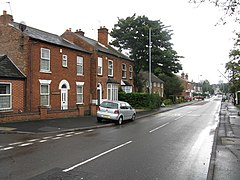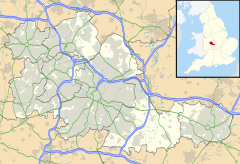Boldmere
| Boldmere | |
|---|---|
 Boldmere Road |
|
| Boldmere shown within the West Midlands | |
| OS grid reference | SP109940 |
| Metropolitan borough | |
| Metropolitan county | |
| Region | |
| Country | England |
| Sovereign state | United Kingdom |
| Post town | SUTTON COLDFIELD |
| Postcode district | B73 |
| Dialling code | 0121 |
| Police | West Midlands |
| Fire | West Midlands |
| Ambulance | West Midlands |
| EU Parliament | West Midlands |
| UK Parliament | |
Boldmere is a residential area of Sutton Coldfield, Birmingham, England. It is bordered by New Oscott, Sutton Park, Wylde Green and Erdington, and is in the ward of Sutton Vesey.
"Boldmere" is a corruption of the word "Baldmoor", coming from the Middle English bald (meaning "") and the Anglo-Saxon moor (meaning ""). Therefore, Boldmere literally means a "bald moor"; a treeless patch. Bald (meaning "") was also a personal name used by the Anglo-Saxons.
At the time of John Speed's 1610 atlas The Theatre of the Empire of Great Britaine, Boldmere was known as Cofield Wast. The area was described as "an open, wild and windy expanse, covered with gorse".
The United Kingdom Census of 1841 refers to the area as Baldmoor Lake, which was once a body of water south of the Chester Road. The lake has also been known as Bowen Pool, Baldmoor, and Bolemore Lake, though no lake is shown on Speed's map of 1610 (nor on other later maps). The census did, however, list a dwelling on the Chester Road as "Lake House". There is, however, a Lakehouse Road and Baldmoor Lake Road in the area.
By 1856, the area had become known as The Coldfield, a name which lasted at least until the introduction of the railway.
On introduction of the 1825 Inclosure Act, the area saw little expansion due to common land becoming privately owned. The 1841 census listed eight families in the area, including agricultural workers, a painter, an Irish carrier, and a wire drawer. It is likely that the latter worked at Penns Mill, a nearby wire mill run by the Webster family (with Baron Dickinson Webster's business involvements including the transatlantic telegraph cable).
...
Wikipedia

